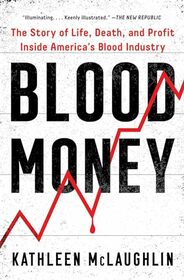My family went through a period of financial struggle when I was growing up (which was thankfully brief and nothing as dire as the hardships many people face), and I remember my mother reflecting on that time and saying with a shudder "I was looking into selling my plasma." My initial reaction was repulsion, but as an adult I now understand that people rely on medications from plasma "donors" and that many people have sold plasma occasionally or regularly to help make ends meet.
The author has a rare disease which is treated by medications formulated with plasma, so she has a vested interest in this subject. In Blood Money, she interviews donors from China, the US, and Mexico and it is clear from her research that the companies who run plasma donation centers target the working poor in the same way as do payday lenders. The fact that the author and many others who can afford the medications are helped by what is essentially the sale of someone's body parts murkies the ethical waters. The problem is that massive profits are made by the companies running the donation centers and manufacturing the drugs, and very little of that money is given to the donors.
At times the writing is repetitive (yes, we understand that you need medication but feel guilty about that people are exploited to make them), but overall this is a fascinating look into what to those of us who are fortunate may consider an underground economy. I appreciate that the last chapters offer a couple of common sense solutions to make compensation for the donors more equitable, but sadly they will likely not be implemented as long as the economic inequality in this country is such that students and people working full time jobs still don't have enough money to make ends meet or enjoy the occasional simple splurge like going to the movies.
The author has a rare disease which is treated by medications formulated with plasma, so she has a vested interest in this subject. In Blood Money, she interviews donors from China, the US, and Mexico and it is clear from her research that the companies who run plasma donation centers target the working poor in the same way as do payday lenders. The fact that the author and many others who can afford the medications are helped by what is essentially the sale of someone's body parts murkies the ethical waters. The problem is that massive profits are made by the companies running the donation centers and manufacturing the drugs, and very little of that money is given to the donors.
At times the writing is repetitive (yes, we understand that you need medication but feel guilty about that people are exploited to make them), but overall this is a fascinating look into what to those of us who are fortunate may consider an underground economy. I appreciate that the last chapters offer a couple of common sense solutions to make compensation for the donors more equitable, but sadly they will likely not be implemented as long as the economic inequality in this country is such that students and people working full time jobs still don't have enough money to make ends meet or enjoy the occasional simple splurge like going to the movies.




